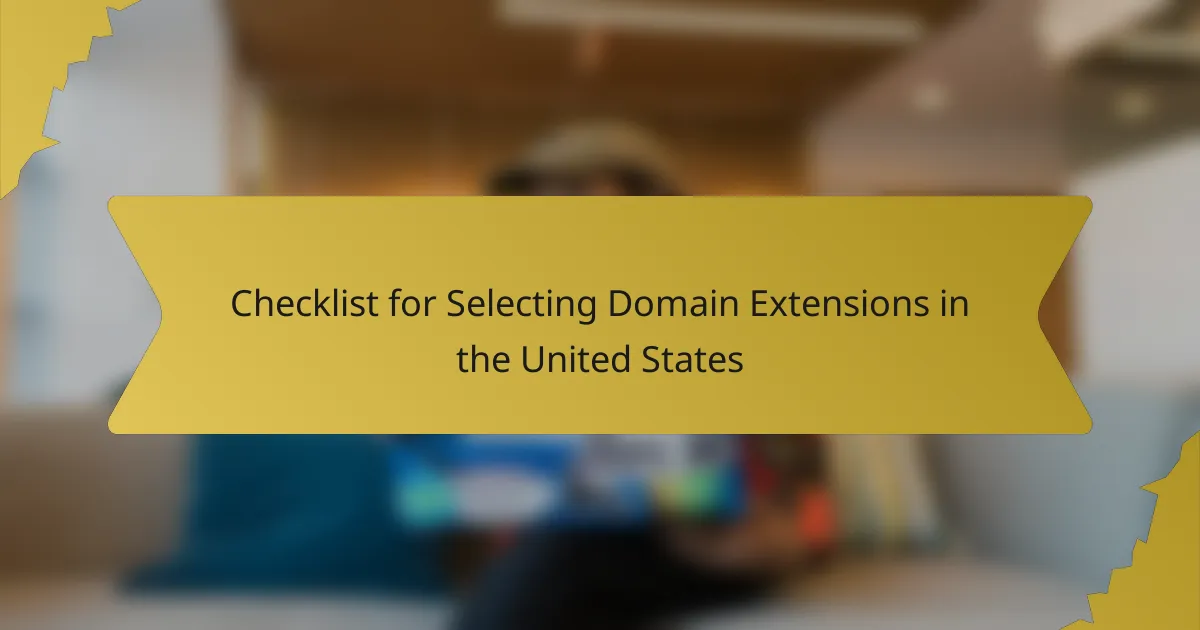Selecting the right domain extension is crucial for establishing a strong online presence in the United States. Options like .com, .us, .org, and .net each serve distinct purposes and can influence branding, recognition, and search engine optimization. By carefully considering your target audience and brand identity, you can choose an extension that enhances your website’s credibility and visibility.

What are the best domain extensions for businesses in the United States?
The best domain extensions for businesses in the United States include .com, .us, .org, and .net. Each extension serves different purposes and can impact branding, recognition, and audience perception.
.com for global recognition
The .com extension is the most recognized domain globally and is often the first choice for businesses aiming for a broad audience. It conveys professionalism and credibility, making it ideal for commercial enterprises.
When selecting a .com domain, ensure it aligns with your brand name and is easy to remember. Avoid complex spellings or unusual characters that could confuse potential customers.
.us for local branding
The .us extension is specifically designed for businesses operating in the United States, emphasizing a local presence. It can enhance your brand’s connection to American consumers and signal that you cater to their specific needs.
Consider using .us if your target market is primarily within the U.S. This extension can help differentiate your business from international competitors and strengthen local engagement.
.org for non-profits
The .org domain is traditionally associated with non-profit organizations, charities, and educational institutions. It conveys trust and a commitment to social causes, making it suitable for entities focused on community service.
If you are a non-profit, using a .org extension can enhance your credibility and help attract donations or volunteers. Ensure your website clearly communicates your mission and values to resonate with your audience.
.net for tech companies
The .net extension is often used by technology companies and internet service providers. It suggests a focus on networking and technology, making it a fitting choice for businesses in the tech sector.
When choosing a .net domain, consider its relevance to your business model. While it may not have the same recognition as .com, it can still effectively represent tech-oriented brands and services.

How do domain extensions affect SEO in the US?
Domain extensions can significantly impact SEO in the United States by influencing search engine rankings and user perceptions. Choosing the right extension, such as .com, .org, or a country-specific option like .us, can enhance visibility and credibility in search results.
Impact on local search rankings
Local search rankings can be positively affected by using a domain extension that reflects a specific geographic area, such as .us for the United States. Search engines often prioritize local relevance, so having a localized domain can help improve visibility in regional searches.
Additionally, incorporating local keywords in your domain name alongside the extension can further boost your chances of appearing in local search results. For example, a business targeting New York might consider a domain like nybusiness.us.
Influence on click-through rates
The choice of domain extension can influence click-through rates (CTR) by affecting user trust and recognition. Familiar extensions like .com generally have higher CTRs because users are accustomed to them, while less common extensions may deter clicks.
To maximize CTR, consider using a well-known extension that aligns with your brand’s identity. If your business is local, a .us extension may resonate better with American users, potentially increasing the likelihood of clicks compared to a generic extension.

What factors should you consider when choosing a domain extension?
When selecting a domain extension, consider your target audience, brand identity, and the specific purpose of your website. The right extension can enhance your online presence and improve credibility with users.
Target audience preferences
Understanding your target audience’s preferences is crucial when choosing a domain extension. For instance, if your audience is primarily in the United States, opting for a .com or .us extension may resonate more with them. Research shows that users often trust familiar extensions, which can influence their decision to visit your site.
Consider conducting surveys or analyzing competitors to gauge which extensions appeal to your audience. A well-chosen extension can foster trust and encourage engagement, leading to higher traffic and conversions.
Brand identity alignment
Your domain extension should reflect your brand identity and values. If your business is local, a .local or .city extension can emphasize your community ties, while a .tech extension might be suitable for a technology-focused company. Choose an extension that complements your brand message and helps you stand out in your niche.
Additionally, ensure that the extension aligns with your long-term goals. For example, if you plan to expand internationally, consider a more generic extension like .com or .net that can accommodate future growth. This strategic choice can enhance brand recognition and loyalty over time.

What are the legal considerations for domain extensions in the US?
Legal considerations for domain extensions in the United States include trademark implications and registration requirements. Understanding these factors is crucial for businesses and individuals to avoid potential legal disputes and ensure compliance with regulations.
Trademark implications
When selecting a domain extension, it’s important to consider trademark implications. If a domain name closely resembles a registered trademark, it could lead to legal challenges from the trademark owner. Conducting a trademark search before registration can help identify potential conflicts.
Additionally, using a domain extension that is associated with a specific industry or region may enhance brand recognition but could also increase scrutiny regarding trademark rights. For instance, using a .law domain for a legal practice may attract attention from trademark holders in that field.
Registration requirements
Domain registration in the US typically requires compliance with specific guidelines set by registrars and the Internet Corporation for Assigned Names and Numbers (ICANN). Registrants must provide accurate contact information and may need to verify their identity, especially for certain domain extensions.
Some domain extensions, such as .gov or .edu, have stricter eligibility criteria, often limited to government entities or educational institutions. Familiarizing yourself with these requirements can prevent registration delays or rejections.

How do different industries utilize domain extensions?
Different industries leverage domain extensions to enhance their online presence and credibility. Selecting the right extension can signal the nature of the business and target specific audiences effectively.
Tech startups and .io
Tech startups often choose the .io domain extension due to its association with technology and innovation. The .io extension, originally designated for the British Indian Ocean Territory, has become popular among tech companies, especially in the software and gaming sectors.
Using a .io domain can help startups convey a modern and tech-savvy image. However, it’s essential to consider that .io domains can be more expensive than traditional .com domains, often ranging from $30 to $100 annually, depending on the registrar.
Educational institutions and .edu
Educational institutions in the United States predominantly use the .edu domain extension, which is restricted to accredited postsecondary institutions. This exclusivity lends credibility and trustworthiness to educational websites.
To qualify for a .edu domain, institutions must meet specific criteria set by the U.S. Department of Education. This includes being a degree-granting institution that is accredited by a recognized agency. The .edu extension not only enhances the institution’s reputation but also helps in establishing a clear identity in the educational sector.

What are the emerging trends in domain extensions?
Emerging trends in domain extensions reflect the evolving landscape of online branding and identity. New generic top-level domains (gTLDs) are gaining traction, providing businesses and individuals with more options to create memorable and relevant web addresses.
New gTLDs gaining popularity
New gTLDs, such as .tech, .design, and .shop, are increasingly popular among startups and niche businesses. These extensions allow for more specific branding and can enhance search engine visibility by aligning closely with the business’s focus.
When selecting a new gTLD, consider your target audience and industry relevance. For instance, a tech company might benefit from a .tech domain, while an e-commerce site could opt for .shop to clearly communicate its purpose.
However, it’s essential to weigh the benefits against potential drawbacks, such as user familiarity and trust. Some consumers may still prefer traditional extensions like .com, so it’s wise to balance innovation with established norms.
